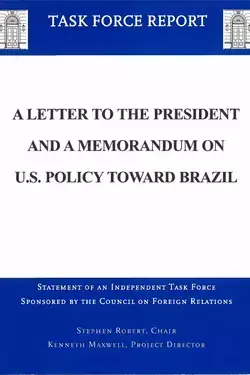
A Letter to the President and a Memorandum on U.S. Policy Toward Brazil

- Task Force Report
- Analysis and policy prescriptions of major foreign policy issues facing the United States, developed through private deliberations among a diverse and distinguished group of experts.
Latin America in general—and Brazil in particular—is coming to the forefront of U.S. policy challenges. In response to this situation, this blue-ribbon Independent Task Force sponsored by the Council on Foreign Relations offers two recommendations: first, that the United States needs a focal point to its policy in South America and that Brazil become that focal point; and second, that President Bush move swiftly to establish a standing, high-level dialogue with Brazil on key issues ranging from drugs to trade, democratization, and combating terrorism and trans-regional crime.
Brazil is the pivotal state in the region, and the United States shares with it many key objectives in the hemisphere. Yet U.S. policy toward Brazil in recent years, the Task Force states, has been one of benign neglect, which has harmed U.S. interests in the region. The report recommends a high-level dialogue between the two nations to cooperate on key issues. The Task Force stresses that this can and should be done without the United States diminishing its ties to other Latin American states. The purpose of the bilateral dialogue is to enhance coherence and effectiveness of policy, not to exclude others.
More on:
The report recommends that the U.S. work with Brazil on democratic reform, because—given the increased challenges to democracy within the region—the continuing success of Brazilian democracy must be of central concern to the United States; on economic reform, because the United States must build on the leadership role it took to sustain economic reform in Brazil during the critical last five years; and on drugs and regional security, because there is a new urgency to work with Brazil in combating the drug scourge and its corrupting influence on governments, public sectors, and public safety throughout the hemisphere.
More on:
 Online Store
Online Store